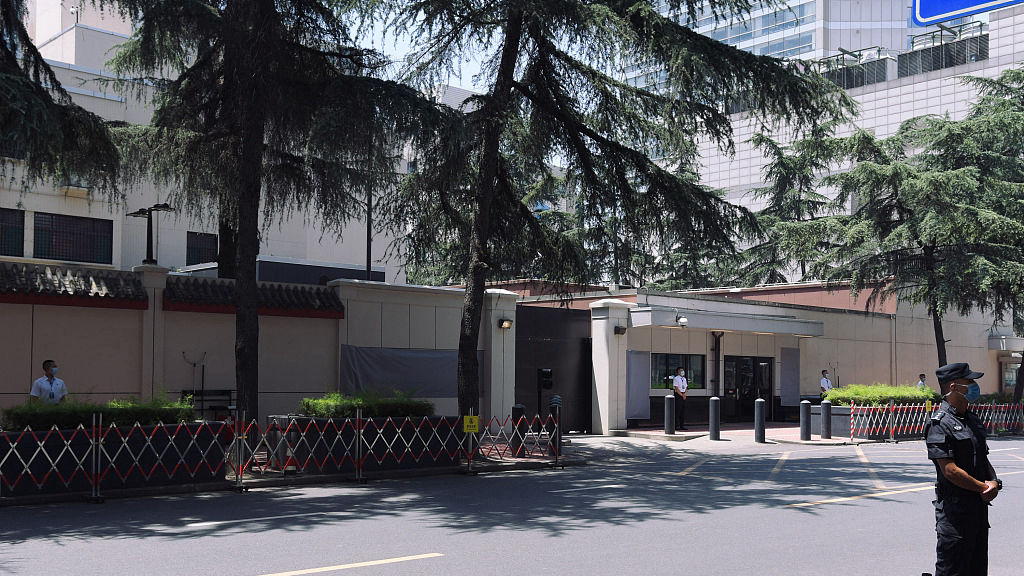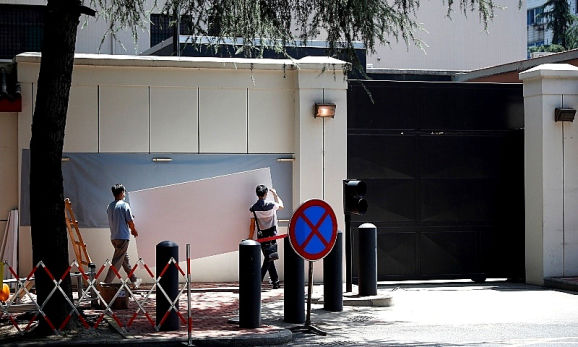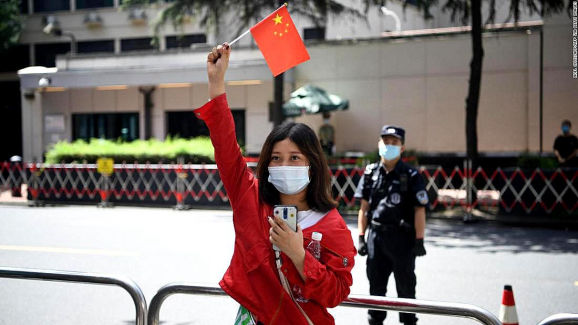
The lowering of the flag at the US consulate ordered to close in Chengdu, should signal a warning to all foreigners inside or outside of Thailand.
29/07/2020
THE LOWERING OF THE US FLAG AND THE CLOSURE OF THE CONSULATE
The escalating tensions between the US and China are now at unprecedented levels. It is time for foreigners in Thailand and those with ties to the kingdom to begin monitoring the dynamics of this relationship and its implications not just for Thailand and Asia, but also for the world. Not only is a cold war developing between the powers with the potential to create two different and separate worlds, but there is, increasingly, the prospect of military conflict over the South China Sea and Taiwan.


Above; Chinese policeman outside the now-closed US consulate in Chengdu this week.
THE CLOSURE OF THE US CONSULATE IN CHENGDU
The closure of the US consulate in Chengdu came in response to the shock closure of the Chinese consulate, a week earlier, in Houston after American authorities accused the Chinese of using the facility as a base for clandestine activities including efforts to steal and appropriate US corporate data as well as research and development intelligence.
The US has long accused China of running an army of hackers from Beijing operated by Chinese security services targeting US servers and intellectual property.

Above; Workers remove insignia and sinage at the US consulate in Chengdu.
US CONSULATE'S INSIGNIA REMOVED BY WORKERS
Following the lowering of the flag in Chengdu on Monday, the road leading to the facility in the city with over 16 million inhabitants in China’s Southern Sichuan province was blocked off by security services. Workers could be seen removing the US consulate’s insignia and sinage.
At the Chinese Foreign Ministry, spokesman Wang Wenbin, told reporters that the US personnel at the facility had been engaged in ‘activities outside of their capacity’. They had also ‘interfered in China’s internal affairs and endangered China’s security and interests’, he said.
US SECRETARY OF STATE
CALLS FOR FREE COUNTRIES
TO UNITE IN OPPOSITION TO CHINA
At the Richard Nixon Presidential Library in California, the US Secretary of State, Mike Pompeo declared that 50 years of US engagement with China beginning with the historic visit to the Communist country by US President Nixon in 1972, had failed.
The Secretary of State said that there was now a clear challenge to the free world to stand up to China and the Communist Party that rules the country from Beijing.
THAILAND SEEN AS A MID-SIZED POWER
Thailand, diplomatically, is seen as a mid-sized power in the world. It has a vested interest in bringing about a balance between the two competing powers and promoting a multilateral world which works for smaller countries as well as for some larger powers such as the UK and the European Union.
Thailand has been known to hedge its position which has seen the kingdom’s military forces train with both US and Chinese armed forces while it has purchased military equipment from both Chinese and US sources as well as increasingly, from third parties.
A key part of Thailand’s policy is to promote the ASEAN group of nations in Southeast Asia with a population of over 660 million and an economic GDP of $9.7 trillion based on 2020 figures. These are significant numbers.
Heightened diplomatic strains could be seen at the ASEAN summit last November outside Bangkok when the kingdom tried to broker the finalisation of the Regional Comprehensive Economic Partnership free trade agreement.
FORMER MALAYSIAN PM CALLED LAST YEAR FOR ASEAN TO EXPLOIT IT"S STRENGTH'S AS A COHESIVE FORCE
At the conference, at least three months before the Covid 19 crisis flared up, there was already a hot rivalry between the US delegation and Chinese representatives which overshadowed the meeting.
At the summit, the veteran Malaysian Prime Minister Mahathir Mohamad, a long-standing opponent of China, acknowledged the strong position that the communist country had attained for itself.
He called on the ASEAN community to exploit further its own population and economy to such an extent.
We should try and learn from China how to develop our countries fast by cooperating with each other,’ he said.
India pulled out of the historic free trade deal involving ASEAN, China, Japan, South Korea, Australia and New Zealand at the last minute.
INDIA VERSUS CHINA, A LESSON
India pulled out during the Bangkok summit based on well-grounded fears for its internal industry and markets if left open to China. Indian Prime Minister, Narendra Modi, who wrestled with the decision, until the last moment, was applauded at home by his own party and the opposition alike on his return.
India, a democratic country, has been left behind economically by China’s rapid economic development driven by an authoritarian system of rule.
To put it in perspective, in 1981, China’s economic GDP was $191 billion while India’s was not far behind on $186.6 billion with a significantly smaller population.
By 2018, China had risen to $13.61 trillion while India was at $2.71 trillion. China’s economy is now five times bigger with both countries having a similar population.
CHINA SEES AUTHORITARIAN RULE AS EFFECTIVE
The point of this is that China sees its authoritarian approach to rule and economic development as a success.
It is not likely to change and, in fact, the situation, from a human rights point of view, is deteriorating.
China, however, is not stopping there.
Its Belt and Road development programme with over 100 countries participating, including Thailand, is increasing Chinese economic influence and also, strikingly, its military capabilities throughout the globe.
RISK OF MILITARY CONFLICT BETWEEN US AND CHINA OVER TAIWAN 'VERY HIGH' SAYS FORMER US INTEL OFFICER
Those who have opposed the regime in Beijing have paid dearly inside China but now, the regime is seeking to extend its influence outside its borders in what one retired US navy intelligence officer, James Fanell, has recently called its ‘expansionist’ policy.
Mr Fanell has said that he believes the chances of a military conflict between the United States and China over Taiwan are ‘very high’ and warns that this could happen at any time in the next decade particularly from 2025 to 2030.
US STANCE HAS HARDENED
The situation has escalated rapidly in recent months with a new mood of increased urgency coming from the US.
In May, the US ambassador, Michael De Sombre, while insisting that Thailand did not have to choose sides, made it clear that the United States of America was a better friend to the kingdom.
It is becoming clear that, at some point, Thailand may, in fact, come under increased pressure to choose.
The door to a middling option of a multilateral world may be closing as China adopts a more assertive tone in the face of human rights violations, its policy on Hong Kong and its increasingly pointed activities in the South China Sea but ultimately the flashpoint may well be Taiwan.
US ELECTION, WILL OF COURSE, BE CRITICAL
A lot will depend on the US Presidential election in November.
Some suggest that Democrat Party contender, former Vice President Joe Biden, may be more sympathetic to rapprochement with China, even a vote for Biden would be a vote for China. Others say that US President Trump is not driven by values and could well find an accommodation with the communist country.
However, the current US President has been remarkably persistent in his outlook towards Beijing. It is one of hostility and suspicion.
The Covid 19 virus, as well the revelations about the treatment of millions of Muslim Uighurs in Xinjiang and the Communist Party’s disregard for its treaty obligations in Hong Kong, have flipped the switch on the world’s view of China, at least in the western world.
TIME FOR FOREIGNERS IN THAILAND TO WATCH THIS SPACE, MORE UNWELCOME CHANGE MAY BE COMING
For foreigners to Thailand, the Covid 19 crisis has meant a complete upheaval leaving tens of thousands stranded outside the kingdom from their loved ones or homes with others unable to travel out.
The crisis should not have come as a complete surprise as warnings about the situation were being issued by the media in January 2020 and throughout February as the situation began to escalate.
There is now another crisis which may be oncoming although it may be in the medium-term.
This involves the deteriorating relationship between China and the United States. It is time to monitor and study this situation as it can be said, for certain, that it will herald changes in the not too distant future.

Above; A woman waves the flag of the Chinese Communist Party in front of the siezed US consulate in Chengdu, China.
MENZZOO MAGAZINE
July 2020
Useful Links;